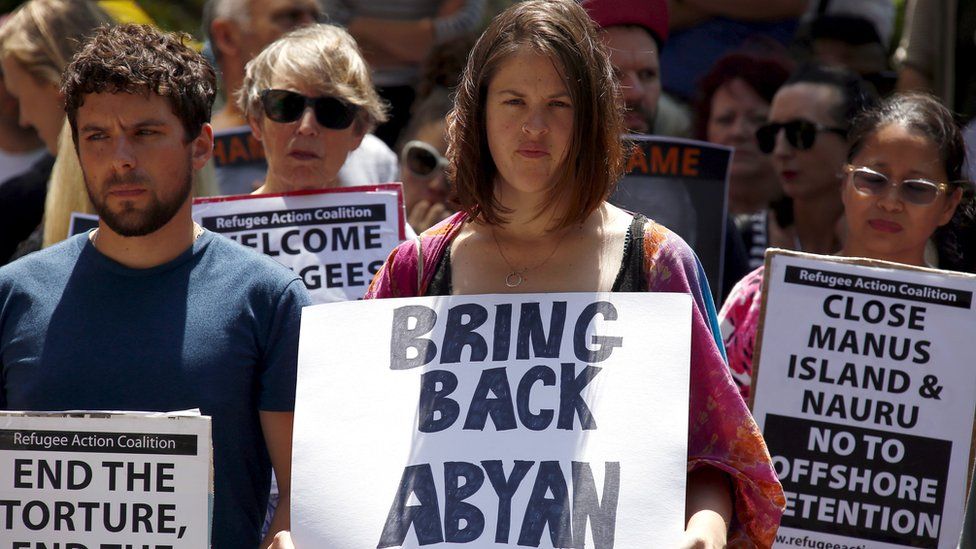Australia row over pregnant Nauru migrant case
- Published

Australia's immigration minister has insisted the government correctly handled the case of a migrant woman who sought an abortion in Australia.
The 23-year-old, a Somali detainee at Australia's detention camp in Nauru, says she became pregnant as a result of being raped in July.
She was allowed to travel to Australia to end the pregnancy, but left on Friday without having done so.
The government said she changed her mind, but she has denied this.
Under Australia's asylum policy, any undocumented migrants trying to reach the country by boat are intercepted and held in centres on Nauru and Manus Island, Papua New Guinea.
'Please help me'
The woman - identified by her pseudonym Abyan - was flown to Sydney last week after requesting an abortion, which is not legal in Nauru in most circumstances.
But on Friday night, she was unexpectedly returned to Nauru, alarming her lawyers and rights groups.
Immigration Minister Peter Dutton said on Saturday that after seeing doctors, she had "decided not to proceed with the termination".
But in a hand-written note released to the Australian media on Monday, Abyan denied this.
"I have been very sick. I have never said that I did not want a termination. I never saw a doctor. I saw a nurse at the clinic but there was no counselling," the note read.
Abyan said she never saw a doctor, or had any counselling, and and that she was seen by a nurse with no translator present.
"Please help me," the statement said.
Her lawyer, George Newhouse, has said she wanted more time to make the decision, and has accused the government of deporting her before he could seek an injunction blocking it.
Australia and asylum
- Many asylum seekers - mainly from Afghanistan, Sri Lanka, Iraq and Iran - travelled to Australia's Christmas Island by boat from Indonesia.
- The number of boats rose sharply in 2012 and early 2013. Scores of people died making the journey.
- To stop the influx, the government adopted hardline measures intended as a deterrent.
- Everyone who arrives by boat is now detained and processed in Nauru and Papua New Guinea. Those found to be refugees will be resettled in PNG, Nauru or Cambodia.
On Monday, Mr Dutton insisted on ABC Radio that the woman had been seen several times by medical and counselling staff, with interpreters on most occasions, and had reached her own decision.
He said he would not allow for women in such a situation to be treated as "political pawns" by opponents of Australia's immigration policy, saying some of the allegations being made were "patently incorrect, if not fabricated".
"I'm very, very concerned about the privacy of this lady, but I'm dragged into this debate to clear up what I think is a political motivation by some of the advocates."
Last week, Mr Dutton said that refugees and asylum seekers on Nauru were asking for medical care in Australia in order to try to have their refugee claims processed on the mainland.
He described the behaviour as a "racket".
The Australian government says its asylum policy deters people-traffickers but there has been been criticism of the conditions at the camps.
In September, a report by a senate committee found conditions on Nauru were not "appropriate or safe". It said allegations of rape and abuse should be investigated.
- Published16 October 2015
- Published12 October 2015
- Published15 October 2015
- Published9 October 2015
- Published1 September 2015
- Published31 October 2017